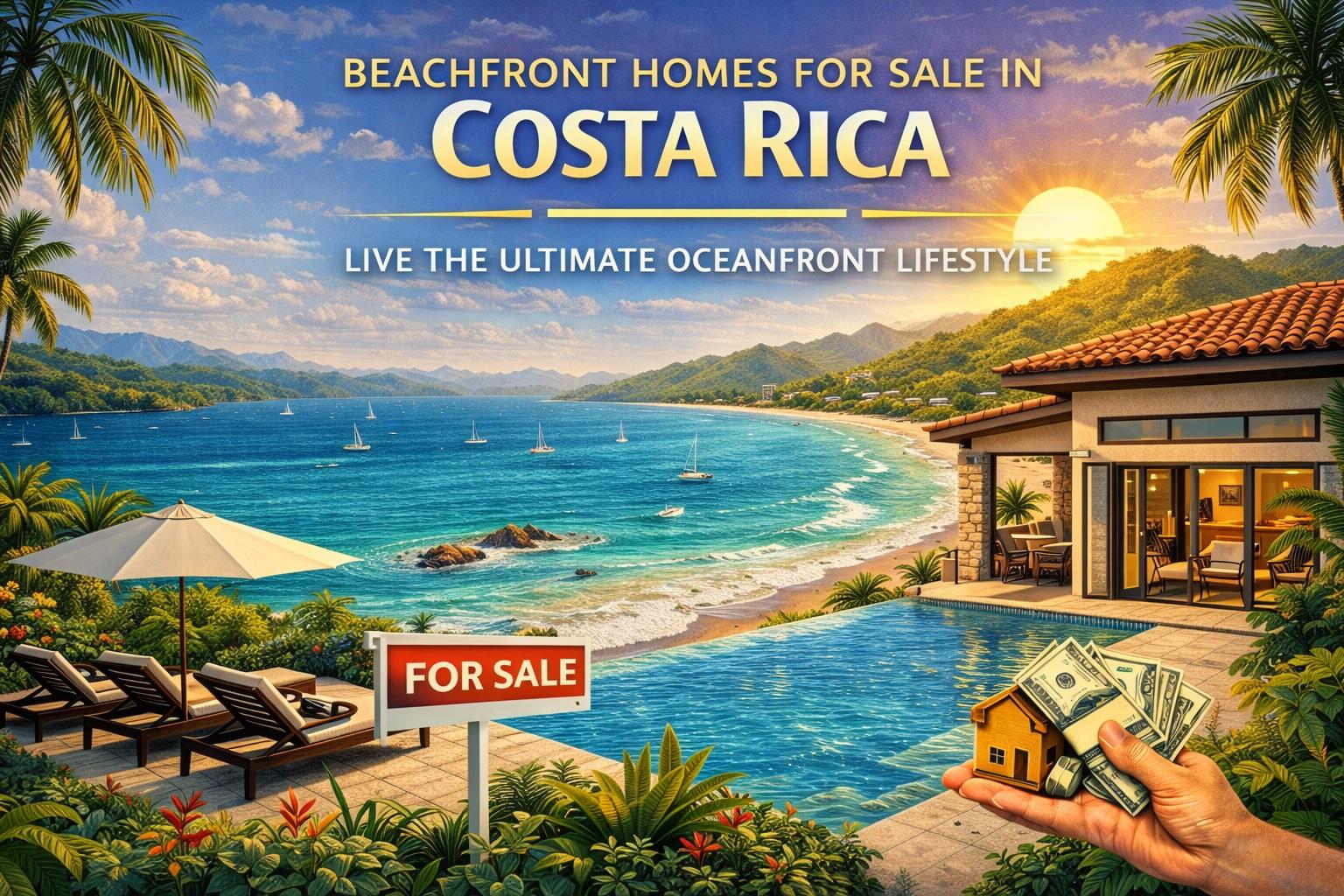Beachfront Homes for Sale in Costa Rica: Live the Ultimate Oceanfront Lifestyle
Costa Rica is world-famous for its breathtaking beaches, lush landscapes, and relaxed way of life, making it one of the most desirable destinations for beachfront real estate. From the Pacific Coast to the Caribbean shoreline, beachfront homes for sale in Costa Rica offer a rare opportunity to own property just steps from the ocean while enjoying long-term value, natural beauty, and an unmatched lifestyle.

Whether you are searching for a luxury villa, a vacation retreat, or a smart investment, Costa Rica’s beachfront real estate market offers options to suit a wide range of goals.
Why Buy a Beachfront Home in Costa Rica
Owning a beachfront home in Costa Rica means waking up to ocean views, sea breezes, and spectacular sunsets every day. These properties offer direct beach access, privacy, and a strong connection to nature that is difficult to replicate elsewhere.
Costa Rica also offers fee-simple ownership for foreigners, a stable democracy, and a strong legal framework for real estate transactions. Combined with high demand for vacation rentals and limited beachfront inventory, beachfront homes continue to hold and grow their value over time.
Prime Locations for Beachfront Homes
Costa Rica offers a variety of beachfront locations, each with its own unique appeal. On the Pacific Coast, areas such as Playa Flamingo, Potrero, Tamarindo, Nosara, Santa Teresa, and Manuel Antonio are among the most sought-after for beachfront living.
These regions offer modern infrastructure, excellent dining, healthcare access, and international communities. On the Caribbean side, locations like Puerto Viejo provide a more laid-back, tropical atmosphere with a distinct cultural flavor.
Each area offers different price points, lifestyles, and investment potential, allowing buyers to choose what best fits their vision.
Features of Beachfront Homes in Costa Rica
Beachfront homes in Costa Rica are designed to maximize views and outdoor living. Many feature open-concept layouts, expansive terraces, private pools, lush gardens, and large windows that frame the ocean.
Luxury beachfront properties may include infinity pools, outdoor kitchens, high-end finishes, smart home systems, and direct beach access. Even more modest beachfront homes provide the priceless benefit of being steps from the sand and sea.
Sustainable design elements are also common, including energy-efficient systems and materials that complement the natural surroundings.
Investment and Rental Potential
Beachfront homes in Costa Rica are among the strongest performers in the vacation rental market. Travelers consistently seek properties with direct beach access, making these homes highly desirable year-round.
High-season demand can generate significant rental income, while long-term appreciation is supported by limited beachfront availability and strict coastal development regulations. This combination makes beachfront properties ideal for investors seeking both lifestyle enjoyment and financial returns.
Beachfront Living for Relocation or Retirement
Many buyers choose beachfront homes in Costa Rica for relocation or retirement. The country’s warm climate, friendly culture, excellent healthcare, and relaxed pace of life make it especially appealing for long-term living.
Beachfront communities often provide a strong sense of community while still offering privacy and tranquility. Whether you prefer an active coastal lifestyle or peaceful seaside living, Costa Rica delivers exceptional quality of life.
Things to Consider Before Buying Beachfront Property
When purchasing a beachfront home in Costa Rica, it is important to understand zoning regulations, maritime zone rules, and environmental protections. Working with experienced real estate professionals ensures proper due diligence and a smooth buying process.
Maintenance, insurance, and property management should also be considered, especially for buyers planning to rent their home or spend part of the year abroad.
Why Beachfront Homes in Costa Rica Remain in High Demand
Beachfront homes for sale in Costa Rica represent one of the most desirable real estate opportunities in Central America. With limited supply, strong rental demand, and unmatched natural beauty, these properties continue to attract buyers from around the world.
Whether you are looking for a luxury beachfront estate, a vacation rental, or a permanent oceanfront residence, Costa Rica offers an extraordinary opportunity to own your home in paradise.
Contact us at contact@costaricavacationrealty.com for updated beachfront listings and expert assistance.

